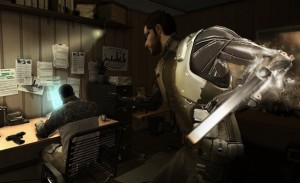 I was the guy. The one guy who didn’t like the original Deus Ex. Yup, I was the gamer who got confused, frustrated and lost all interest because the game was too open, didn’t give me enough guidance and left me to figure things out for myself. I went back to FPS games like Project IGI and Perfect Dark; games where you explored a purely traditional game world without RPG trappings, open-ended storylines and emergent gameplay. It took more than ten years of cinematic FPS’s with purely linear storylines and more gung-ho military shooters than I could have possibly imagined for me to come to a realisation: I was wrong about Deus Ex and everyone else was right. It was a great game…. and now it’s also a great series.
I was the guy. The one guy who didn’t like the original Deus Ex. Yup, I was the gamer who got confused, frustrated and lost all interest because the game was too open, didn’t give me enough guidance and left me to figure things out for myself. I went back to FPS games like Project IGI and Perfect Dark; games where you explored a purely traditional game world without RPG trappings, open-ended storylines and emergent gameplay. It took more than ten years of cinematic FPS’s with purely linear storylines and more gung-ho military shooters than I could have possibly imagined for me to come to a realisation: I was wrong about Deus Ex and everyone else was right. It was a great game…. and now it’s also a great series.
And I know Invisible War wasn’t perfect; in fact it was a huge let down to those who loved the original. It was a huge boon to the developers of Human Revolution though. At every point, the developers could point to the second game and say “less of this kind of thing”. If Invisible War represented a developer taking Deus Ex in one direction, Human Revolution is once again taking that original, but sprinting off the opposite way. The result is something that takes heed of current console and PC RPG’s, looks and sounds great, plays brilliantly but also somehow has a retro feel about it. This is a game that makes you think of classic titles from ten years ago fondly. Its smoothed off all the rough edges that games of that period had, yet it somehow seems to have kept the things that made these titles great but has been forgotten by developers who are too keen on spectacle, explosions and Michael Bay. Human Revolution is to games what Inception, Terminator or even Blade Runner is to movies.
 That’s not the only movie allusion in Human Revolution. The beginning of the game is pure Robocop, from the gritty mecha cyborgs to the brutal damage done to your character by the cybernetically enhanced opponents. From there, the game takes on a Mass Effect 2 vibe as you are rebuilt and reborn. No opportunity is passed up to ruminate on the conflict between science and evolution, the morality of machine-enhanced humans and the potential loss of our souls as we become one with the machines. These opening scenes are nothing but a long exclamation of “I survived, but at what cost”.
That’s not the only movie allusion in Human Revolution. The beginning of the game is pure Robocop, from the gritty mecha cyborgs to the brutal damage done to your character by the cybernetically enhanced opponents. From there, the game takes on a Mass Effect 2 vibe as you are rebuilt and reborn. No opportunity is passed up to ruminate on the conflict between science and evolution, the morality of machine-enhanced humans and the potential loss of our souls as we become one with the machines. These opening scenes are nothing but a long exclamation of “I survived, but at what cost”.
The story is pure William Gibson sprinkled with Philip K Dick by way of his movie adaptations rather than his novels. Blade Runner is an obvious point of reference and a strong one, but it owes a visual debt as much to that noir-ish, moody detective story as it does to The Matrix (trench coat, numerous visual effects) and Ghost in the Shell (the mechs and the weapons). The game itself uses a golden glow to depict interactive objects with a wire frame effect that the Wachowskis would be proud of. Apart from the pitch perfect tone and art style, the game looks great. Environments and areas are small but well detailed; most reminiscent of the half-empty streets of The Darkness or the cramped corridors and industrial wastes of the Chronicles of Riddick. These open town areas (including China and Detroit) are hubs from which you find more secure, enemy filled areas like underground bases, refineries and police stations. The game zips along most of the time, but on the 360 version there are larger vistas with moving monorails and long distance views above futuristic cities that push the hardware a little too much and make the whole thing chug a little. Graphical glitches are also fairly frequent with twitching dead bodies a recurrent theme. As with any open-ended game like this there are bound to be some such issues, but the tone of the game was at one point ruined completely for me as a dead enemy shook uncontrollably while a discarded machine gun jutting out of his crotch rotated slowly on its axis.
 Early on Deus Ex does its best to convince you that it’s a shooter, but this is before pushing you into a game where you might never shoot again for upwards of six hours. The opening scene is once again reminiscent of Mass Effect 2 with enemies invading a base that you kill off, using a combination of basic shooter covers mechanics and bad AI to defeat your opponents. The way the enemies enter the room, slowly wandering down steps in single file, makes them seem wholly robotic and you’re surprised to see these are supposed to be simple human enemies. Not a great start.
Early on Deus Ex does its best to convince you that it’s a shooter, but this is before pushing you into a game where you might never shoot again for upwards of six hours. The opening scene is once again reminiscent of Mass Effect 2 with enemies invading a base that you kill off, using a combination of basic shooter covers mechanics and bad AI to defeat your opponents. The way the enemies enter the room, slowly wandering down steps in single file, makes them seem wholly robotic and you’re surprised to see these are supposed to be simple human enemies. Not a great start.
Early experiences of Human Revolution were very much like my early experiences with the first in the series: confusing. You acquire augments through the use of Praxis. You acquire Praxis through experience, or you can buy a few from the local LIMB clinics in the game. As the initial building you work in and the surrounding city of Detroit is small but completely maze-like – replete with secret passages, air vents to climb through and routes blocked by moveable objects – I frequently stumbled into missions before I was ready for them. It was not until I found the LIMB clinic and bought some upgrades that I was ready to actually face the missions I had already been struggling my way through. Without appropriate upgrades Deus Ex can be brutally hard. Ammo is in short supply and if you find yourself faced with multiple enemies and nothing to fight them with, Human Revolution is not the kind of game to toss out some refilling ammo crates to help you out. As a result stealth is the preferred option, and with the associated huge XP bonuses it’s clearly the way the developers want you to play. Without augments to give you enemy locations, identify their guard routes, make your steps silent or even turn you invisible though, getting around your opponents without killing them is slow and difficult. The option to save anywhere is not common on console games, but in this game it is one of the wisest inclusions the developers have made.
 Once you get past the first few areas and hit your stride you begin to realise just how many different options there are for facing each situation. Early on in the game you were stuck between guards you couldn’t fight and crates you couldn’t move, relying on broken AI to scrape through. While at these stages you were waiting for your battery cell to recharge to perform a basic melee take down, later your batteries recharge faster and you have more. The crates that blocked your way can now be shifted, or even thrown at your enemies. Even fridges and vending machines can be hurled, while you are now able to jump over electric fences before parachuting to the ground, rather than hunting around for a switch like you had to in the beginning of the game. Hacking – one of the most important and ubiquitous of abilities – is now a hindrance rather than a barrier and allows you to not only open doors, but to turn off security cameras or even take control of robots and turrets to take out enemies. The amount of fun that can be had when you unlock these toys is huge, but it’s also brave. By locking all of these abilities away the developer has back loaded the game, unlike so many other titles. While Modern Warfare and its ilk may try to blow you away with an astonishing opening before sliding into a mid game lull, Human Revolution just gets better as it goes on. A particular highlight of these augments is the Typhoon Explosive System; it may be a luxury, but its hugely satisfying to level a whole room full of enemies with this visually spectacular smart bomb attack.
Once you get past the first few areas and hit your stride you begin to realise just how many different options there are for facing each situation. Early on in the game you were stuck between guards you couldn’t fight and crates you couldn’t move, relying on broken AI to scrape through. While at these stages you were waiting for your battery cell to recharge to perform a basic melee take down, later your batteries recharge faster and you have more. The crates that blocked your way can now be shifted, or even thrown at your enemies. Even fridges and vending machines can be hurled, while you are now able to jump over electric fences before parachuting to the ground, rather than hunting around for a switch like you had to in the beginning of the game. Hacking – one of the most important and ubiquitous of abilities – is now a hindrance rather than a barrier and allows you to not only open doors, but to turn off security cameras or even take control of robots and turrets to take out enemies. The amount of fun that can be had when you unlock these toys is huge, but it’s also brave. By locking all of these abilities away the developer has back loaded the game, unlike so many other titles. While Modern Warfare and its ilk may try to blow you away with an astonishing opening before sliding into a mid game lull, Human Revolution just gets better as it goes on. A particular highlight of these augments is the Typhoon Explosive System; it may be a luxury, but its hugely satisfying to level a whole room full of enemies with this visually spectacular smart bomb attack.
The lack of modern gameplay tropes is noticable throughout the whole campaign. While balancing your inventory is annoying, there’s no short cuts like melting your items down to omni-gel or selling them to anyone you meet. To do so, you need to travel to the shop and sell it to the person who wants to buy. There’s little in the way of fast travel and no shortcuts to replenishing your health or stamina. Your batteries are recharged by eating candy and that is all. This isn’t Fallout 3, you can’t just find a bed to sleep in to get your health back. If you upgrade a gun you love there’s no guarantee you will find ammo for it. You may have fitted a silencer, ammo clip and optical site to an expensive paper weight. Finally, you may have chosen augments which are completely useless while avoiding ones that actively make the game better.
Augments don’t just make some aspects of the game easier, they make them possible. If you don’t have the jumping augment to get you onto a roof area complete with gardens, enemies and NPC’s then you may never see that whole area. Ever. That’s whole levels worth of content that the developers are willing to lock away; that designers have balanced and artists have lovingly crafted that they are willing to make optional. This is the antithesis of modern game design, where there’s always a button prompt available to make sure you look in the right direction each time a car explodes or a helicopter swoops overhead.
 There’s a famous, possibly apocryphal story about Gabe Newell and Warren Spector, the respective Half Life and Deus Ex creators. When they discussed game design, Newell explained how the player should see all the best bits of the game, and the designers job was to show them everything. Like a virtual tour guide showing them all the beautiful sites of a virtual world, the designers job was to make sure the player missed nothing and all of the artists and level creators work was fully experienced and appreciated lest it be wasted effort. Spector meanwhile wanted the gamer to feel like whole paths were available apart from the one he walked; that his route through the game was but one of many options and different players would each have totally different experiences.
There’s a famous, possibly apocryphal story about Gabe Newell and Warren Spector, the respective Half Life and Deus Ex creators. When they discussed game design, Newell explained how the player should see all the best bits of the game, and the designers job was to show them everything. Like a virtual tour guide showing them all the beautiful sites of a virtual world, the designers job was to make sure the player missed nothing and all of the artists and level creators work was fully experienced and appreciated lest it be wasted effort. Spector meanwhile wanted the gamer to feel like whole paths were available apart from the one he walked; that his route through the game was but one of many options and different players would each have totally different experiences.
For me the type of game that Spector envisions is preferable in every way. From Fallout 3 to Oblivion to Alpha Protocol, the freedom to choose a path and walk it is one of the reasons I play games. Modern Warfare or Uncharted or Dead Space may be cinematic and polished, but without the freedom to explore a unique path and shape the events of the story itself I feel like something is missing. The compromise is that with this freedom its harder to craft convincing NPC behaviour, complex storylines or cinematic set pieces. The pay off though is that when the story beats work and when the action does become spectacular, it’s all the more impressive because its come from the interaction between the world and the player, not something mapped out years in advance by the designer.
There’s a reason that the CalmDownTom team have all been talking about Deus Ex when we see each other; much more than we talked about Halo or Mass Effect. It’s because we are all-seeing different things from the same game; all playing out the same scenarios in different ways. It’s a game that lends itself to discussion and to anecdote. I could tell a million stories about how one cool scene played out, or give hundreds of pages of advice on augments to unlock.
 I won’t do any of that though. Instead I’ll ask one thing: that you go play the game. Once you have, come back. Then we’ll talk. You’ll have stories and so will I, and they will all be personal and wonderful to us, and they will all be different.
I won’t do any of that though. Instead I’ll ask one thing: that you go play the game. Once you have, come back. Then we’ll talk. You’ll have stories and so will I, and they will all be personal and wonderful to us, and they will all be different.
Ten years ago I was wrong about Deus Ex. I gave up early and didn’t get to fully experience one of the greatest games of all time because I was a pussy. I wussed out because it was hard, open ended and ambitious. Human Revolution is the same. If you go expecting a modern shooter that hustles you down a corridor with invisible walls and holds your had the whole way you will be disappointed. If you realise the power of the tools that you are given and use your imagination, you will experience things no other game allows. You will make stories, and those stories will be your own. What more do you want from games than the opportunity to do such things?
9 precious praxis points out of 10
*Disagree with the review? Read Ealiom’s second opinion!*
